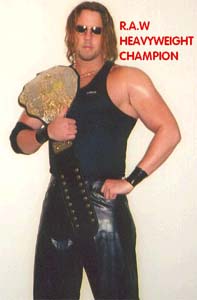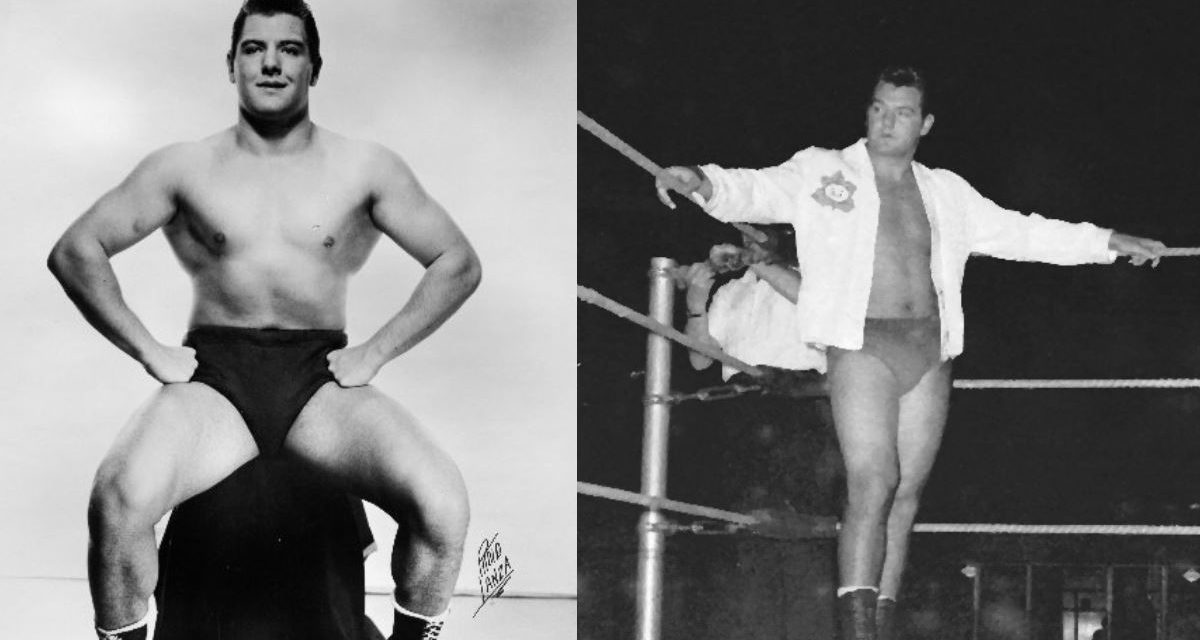It is shaping up to be an interesting summer out in the Maritimes. Emile Dupre’s Atlantic Grand Prix promotion faces a serious challenge from Real Action Wrestling, which recently changed owners and has been gearing up for a fight.
At stake is the Maritime wrestling market, a long-time hotbed for pro wrestling during the summer. Each promotion has their own ideas about what works and what doesn’t with today’s wrestling fan — but the one thing they can agree on is that there isn’t room in the East for two promotions over the long haul.
“There is only room for just one, and that’s me,” said Dupre, whose promotion starts up May 3 in Halifax. “They can do whatever they want, but I’ve been running this territory since 1962.”
Warren Olsen is one of two principal owners in Real Action Wrestling (R.A.W.), and he thinks that there’s room for some competition. “I think we’re just an alternative, to be honest with you. Grand Prix’s been around here a long time, it’s well established. We don’t mean any disrespect to Emile. We’ve got a lot of respect for him, he’s been doing this since ’62. But I think what we offer is a more up-to-date booking style.”
In talking to wrestlers and other people involved in the tours, it’s the style that’s the core of this brawl. Dupre, who has partnered with businessman Mike Zinck this summer, runs an older-style promotion, with little glitz and even less fanfare. It’s a throw-back territory, which on one hand seems terribly out-of-date, yet is an unique training group for up-and-coming stars, one of the few places around to work every day. The list of legends who have come through the territory is staggering: Randy Savage, Edge, Leo Burke, Harley Race, Bad News Allen, J.J. Dillon, Rick Martel, Andre the Giant, Cuban Assassin, Bulldog Bob Brown, Christian.
Zinck hopes to change that perception of Grand Prix, at least in the Nova Scotia towns which he’ll be running. He wants to “tell the people we don’t have the same old-style of wrestling. It’s going to be updated and more detailed. I think the old-style back in the ’70s, and don’t get me wrong, I’m not knocking it, it was good in the day, but now you’ve got to change it a little bit. You’ve got to go with what the fans want.”
Ontario indy star and Border City Wrestling promoter Scott D’Amore summed up the Grand Prix experience. “Being on Grand Prix Wrestling means that you’ll lose weight, you won’t train properly, you’ll be overtired because you’re never going to sleep because you’re wrestling seven days a week. One day, you’ll go from the bottom of Nova Scotia to the top of New Brunswick, back down to the middle of Nova Scotia, then up onto P.E.I. Island, then maybe back into New Brunswick. And you’ll just get thrown around everywhere. And it’s 100 per cent clueless where you’re going to be.”
Real Action offers fans a little more what they are used to seeing on television these days — hardcore matches with tables, chairs and weapons, high flying moves, lights, some fireworks. “Today’s wrestling fans don’t really want to see a headlock, and see it held on there for 5, 10 minutes then on to the mat and the chinlock, and reverses,” said Olsen. “Don’t get me wrong, myself I like that stuff, I like the old style wrestling personally, but I don’t think it would sell anymore.”
Frank Parker is the most experienced referee out East, and he is firmly in the camp of R.A.W. after years working for Dupre and Grand Prix. “With the new guys, one of the reasons they hired me was because of my experience. They listen to me. They ask me over and over again for my input on things. I’m being paid what I’m worth with these guys — I sure as hell wasn’t with Dupre because he’s a cheap prick, and you can quote me.

‘Kowboy’ Mike Hughes
“The new guys, they’re willing to make it work. They want to do things the way they’re done in this present year. The booking isn’t going to be ’50s and ’60s like Dupre, it’s going to be up to the present time. And these guys are willing to spend money to bring in talent.”
‘Kowboy’ Mike Hughes is one of the founders of R.A.W. He explained that he started the promotion with long-time friend Skot Gallant because he wanted to wrestle close to home during the winter months. He claimed that there was never any intention to put Grand Prix out of business, just a desire to work year-round. According to Hughes, Gallant never had the time to dedicate to the promotion, and the sale of the promotion to Olsen and partner Brian Marchand (collectively New Age Entertainment Limited) was a good thing. Olsen and Marchand bring better resources and more promotional skills to the table. Hughes, as one of the bookers with Peter Smith (aka Kingman / The Mighty Hercules), is geared up to offer something very different than Grand Prix.
Hughes promises that Maritime fans will have a reason to come back to the matches the following week with episodic booking. “There’s more angles involved, more storylines. It’s not, go out, give them five matches, take it or leave it, but come back next week because there’s five more wrestling matches, and there might not be a lead-in. That’s what Grand Prix was giving. And we’re giving people a storyline, something that ‘I have to come back next week because I want to see what happens between these guys. I want to come back after that because this might happen.’ Just leave the door open a little for them at the end of the night so there’s a reason to come back.”
Dupre has reason to be bitter and betrayed. Hughes is one of his former workers, and someone who he helped get established in pro wrestling. “I had all kinds of opposition here, but they never made it. And I don’t think these guys are going to make it either. Not only that, if you don’t mind me saying, over 50 per cent of the guys on that card are guys that I started in wrestling, trained them, and gave them their name.”
He’s got at least one wrestler firmly in his corner, however. It’s his son, Rene Dupre, who at only 17 is entering his fourth summer as a wrestler. “Grand Prix has been the leader in wrestling here for over 35, 40 years,” Rene said. “I personally know that they will remain a leader. If you want to have a bunch of people, let’s call them Grand Prix rejects — that’s pretty much what they are –come here and try to steal the territory from a guy who’s been in it his whole life is an insult.”
On the Grand Prix tour this summer are names like Rene Dupre (Emile’s son), Mad Dog McFly, Tony Gold, Rock Evans, Hans Shultz, Todd The Bodd, Krusher Karlman, Ruffy Silverstein, Cliff MacDonald, Vance Nevada and Mentallo.
Kurrgan, Larry Destiny, Kingman, Kowboy Mike Hughes, Bill Skullion, Notorious T.I.D., Rogue, Duke MacIsaac, Bobby Rude, Buddy Lane are coming in for the R.A.W. tour, which starts tonight in Pt. Hawksbury, Nova Scotia. Bigger names like Joe E. Legend (the recently-released Just Joe from the WWF), Chi Chi Cruz and Wildman Austin are expected in later.
Besides the fight for fans, the competition for arenas is also fierce. While Grand Prix has some of the bigger arenas locked up, R.A.W. is running some school gymnasiums. In Halifax, for example, Grand Prix is running the Halifax Forum on May 3, while R.A.W. is outside of town at the Exhibition Park on April 22. The same scenario is repeated in many locations — locations that Dupre claims to know well, and what town will draw once and what town will draw repeatedly.
He provides the example of Kentville, Nova Scotia, where R.A.W. is running April 25. “I’ve run that too. If you’re lucky, you draw one fair crowd. And then when you go the second time around, you draw 50 people. Watch if I’m not right.”
Dupre obviously has his sources, and names attendance figures for some of the past R.A.W. shows.
Olsen admits that R.A.W. has run into some difficulties getting bookings in the towns that Dupre has traditionally run during the summer, but that hasn’t stopped them. “We said, there’s new markets out there, there’s other towns that haven’t been hit. Or every town has more than one venue. We’ve only had a hard time in two or three towns.” Olsen cites Charlottetown as a town they developed (initial owner Gallant was from P.E.I.). “We’re going to try it out, and try different towns and see what works and what doesn’t.”
Kowboy Hughes isn’t worried about the competition. “I think they’re more worried about it than we are. They keep calling venues, telling them not to book us, and saying that we don’t have a legitimate organization. That’s basically been our problem. But as you look at the roster, I think we’re probably the most talented roster in Canada right now.”
Dupre scoffs at the notion of trying to keep the arenas on his side, and offers up his own examples. “[Olsen’s] got pretty stories. He calls the arenas and says, ‘Look, Emile Dupre and this Mike Zinck, they don’t have any wrestlers, they don’t have nobody. I don’t even think they’ll show up for the show.’ That kind of stuff. Well, I’m not doing that. I’m saying Emile Dupre has been in business for so many years. Did I ever once not show up with a show? Take my track record. Some of them said, ‘Well, we never even thought about going with anybody else. We’ve been going with you for all these years.’ They didn’t even listen to them.”
Zinck is confident with his bookings across Nova Scotia, and put up money to guarantee the buildings would be his. “I think we’ve got the better buildings, the better areas. They’re exclusive to us, and they’re not letting anyone else in the buildings that we’re into. And I think we’ve got the better towns.”
The competition has even extended to the web, where Grand Prix has launched a web site — www.worldgrandprixwrestling.com to compete with the R.A.W. site — www.realactionwrestling.com.
The little guys
Lost in this battle as well are the tiny Maritime promotions, like MainStream Wrestling and Island Wrestling Federation, which are generally no bigger than backyard wrestling shows with actual rings.
“I don’t really consider them a threat. I say that and it could end up biting me in the ass, I guess. But they don’t have many big guys,” said Olsen.
Hughes gave even less time to the thought of the tiny promotions as a threat. “If you go to a wrestling show, and you’re sitting there as a fan, and you’re looking at a guy 120 pounds, why are you paying to see somebody smaller than average? You want to go see something that’s out of the ordinary. To see a bunch of 16, 17-year-olds that are all 124 pounds, there’s no mystique. For a guy sitting in the audience, he looks into the ring and says, ‘You know, I think that I can beat that guy up.’ There’s no illusion, no mystery to the whole thing. When you see a big man walk out, like for example Kingman or Kurrgan, people sit there in awe of their size. But when you have a guy walk out, and he’s five inches shorter than you, and probably close to 100 pounds lighter than you, why’d I pay my ten bucks again?”
RELATED LINK

